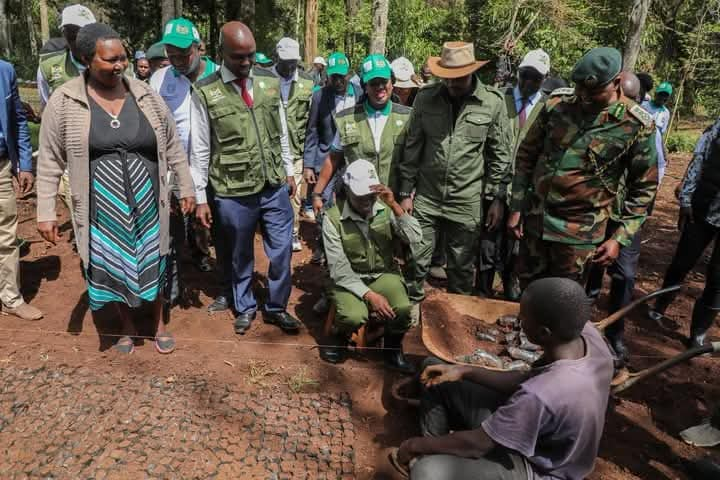The Government of Kenya, through the National Environment Trust Fund (NETFUND), has launched a Sh667 million project aimed at restoring the endangered Cherangany Forest Ecosystem. Dubbed ‘The Restoration and Sustainable Management of the Cherangany Forest Ecosystem and improved livelihood project,’ project, also funded by the Italian Agency for Development Cooperation, targets over 1,000 smallholder farmers in Elgeyo Marakwet and West Pokot counties who are to plant 18 million trees in three-years. The Cabinet Secretary for Environment, Climate Change, and Forestry, Dr.
Deborah Barasa, who presided over the launch held at Chebara Agricultural Training Centre, affirmed the government’s commitment to environmental restoration. “The government is committed to strengthening partnerships for restoring the country’s precious but endangered forest ecosystems,” Dr. Barasa said.

“To this end, I want to thank our development partners and NETFUND for spearheading this initiative.” Dr. Barasa urged all Kenyans to actively participate in the restoration efforts.
“Whether it’s planting trees, spreading awareness, supporting sustainable practices, or simply taking a stand for the environment—every action matters,” she said. Italian Deputy Ambassador, Lorenza Maria Gambacorta emphasized her government’s commitment to supporting climate resilience in Kenya. “We are proud to be part of this initiative.
This reflects Italy’s political and financial dedication to tackling the global challenge of climate change,” said Gambacorta. “We believe in combining development and restoration to achieve meaningful impact.” Gambacorta revealed that Italy has approved and funded two projects in Kenya to a value of 224 million Euros and was optimistic that the Cherangany restoration project will also be a success.
Elgeyo Marakwet County Governor Wesley Rotich lauded the Italian Agency for Development Cooperation for the generous grant while also appealing to the ministry for greater community involvement in forest management. “I urge the CS to ensure our people are at the heart of this project. Local communities must be part of the solution,” Governor Rotich said.
The project aims to plant 18 million trees and is anchored on four pillars: strengthening forest governance, producing certified high-quality seedlings, promoting sustainable land-use practices, and raising public awareness to mobilize community and private sector support. The Principal Secretary for Environment and Climate Change, Eng. Fetus Ng’eno, underscored the objective of the project, which is to assist farmers in engaging in sustainable farming practices while conserving forests.
NETFUND Chief Executive Officer Samson Toniok underscored the significance of the project in bolstering climate resilience and economic growth. “Restoration of this ecosystem is crucial for our economy and future generations. We are committed to a coordinated approach involving all stakeholders,” said Toniok.
The initiative also aligns with President William Ruto’s ambitious goal of planting 15 billion trees by 2032—a flagship project under government’s climate action agenda. Principal Secretary for Arid and Semi-Arid Lands Department and Regional Development, Kello Harsama, revealed that the Kerio Valley Development Authority KVDA has already planted 13.5 million trees and pledged to support the programme.
“We commend the women’s groups running successful tree nurseries. KVDA will continue supporting them by providing seedlings, training, and linking them to KEPHIS for certification,” Harsama said. NETFUND will oversee project implementation in collaboration with the county governments of Elgeyo Marakwet and West Pokot, Kenya Forestry Research Institute, Kenya Forest Service, and various community organizations.
The Cherangany Forest, a critical water catchment and biodiversity hotspot, has suffered from decades of degradation. This project is expected to significantly reverse deforestation trends while boosting local livelihoods and climate resilience..
Environment

Kenya partners with Italy to restore Cherangany Forest

The Government of Kenya, through the National Environment Trust Fund (NETFUND), has launched a Sh667 million project aimed at restoring the endangered Cherangany Forest Ecosystem. Dubbed ‘The Restoration and Sustainable Management of the Cherangany Forest Ecosystem and improved livelihood project,’ project, also funded by the Italian Agency for Development Cooperation, targets over 1,000 smallholder farmers...















